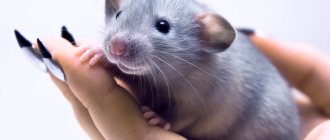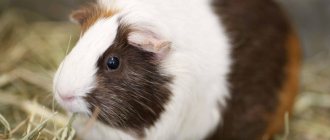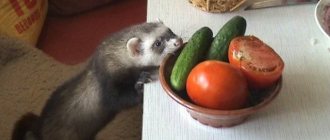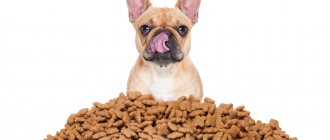When keeping a domestic rat, its diet is very important, which should be varied. Thanks to this diet, the pet will receive all the useful vitamins and microelements, and will also increase its life expectancy. As you know, your pet gets a lot of vitamins from consuming vegetables, fruits and fresh herbs. Therefore, in addition to dry food and animal protein, the diet of a domestic rat should include a variety of vegetables, fruits and herbs. But this omnivore should not be fed these foods indiscriminately. Therefore, the answer to the question can rats eat vegetables is yes, they can, but not all of them. What vegetables can a rat eat, in what quantity and in what form we will look at in our article.
How to feed vegetables
All foods that are intended to be fed to a rat must be fresh, clean and at room temperature. Therefore, if you store vegetables in the refrigerator, then first remove them from there, wait until they warm up, rinse well, cut, and only then offer them to your pet. It is best to feed rodents vegetables grown in your own garden. If you buy products at the market, you should choose very carefully, buying only in season.
Vegetables and root crops must be prepared for feeding. They are sorted through, throwing out the rotten, flabby, and discolored ones. In addition, you need to remove debris and dirt, cut off the affected areas, wash the vegetables and cut them into pieces. The pieces should be of such a size that the pet can hold it in its paws.
It is not allowed to feed spoiled and rotten vegetables or other foods to domestic rats!
Vegetables should be offered to your pet daily or every other day. The approximate average portion of vegetables and fruits per individual should be 10-15 grams.
New foods are introduced into the rat’s diet gradually in small portions once or twice a week. It is necessary to constantly monitor the pet; if there are no signs of diarrhea, then you can increase the amount of this product. If you notice signs of diarrhea, then remove this product from the rodent’s diet and feed it the same food.
Feeding the rats
Choosing bowls for feeding the rat. Metal bowls can create sound frequencies that can irritate rats. Use ceramic bowls instead of metal bowls. Ceramic bowls are heavier and therefore harder for rats to knock over when feeding. Select a small bowl; The larger the bowl, the less space the rat has in the cage.
Rules for feeding rats. Always remember that when you introduce something new that the rat has not tried before, you must introduce it gradually, a small piece at a time, and then gradually increase the dosage day by day. If something new causes diarrhea in your rat, you should immediately stop giving it.
What not to feed rats.
- Don't give spoiled food
- spicy,
- fatty,
- salty,
- sweet,
- canned food,
- citrus,
- cabbage,
- beets,
- legumes,
- radish,
- rhubarb,
- radish,
- turnip,
- beans,
- cheese,
- sour cream,
- cream,
- condensed milk,
- honey,
- jam,
- chips,
- alcohol,
- coffee,
- chocolate,
- salo,
- sausages,
- cakes,
- candies,
- citrus seeds.
Feeding the rats
Tomatoes
Can rats eat tomatoes? The answer to this question is also positive. But these vegetables should only be given when ripe and in small quantities, since they contain acids. Unripe fruits contain solanine, just like leaves and tops, so they should not be fed. Pickled and canned tomatoes are also contraindicated for pets. If you do not grow your own vegetables, then tomatoes can only be given to rats during the season.
Pepper
Bell pepper contains many vitamins. Therefore, rats can have pepper, but only once a day, if your pet is not prone to increased gas production.
Eggplant
Inexperienced breeders are often interested in whether rats can eat eggplants. Before feeding this vegetable to your pet, it is necessary to wash it well, peel it and heat it. Leaves and tops should not be fed to a rodent because of the solanine they contain.
Cabbage
But can rats eat cabbage? Red, white, and Brussels sprouts should not be given to pets, since this vegetable increases gas formation in rats. Broccoli and cauliflower can be eaten in small quantities and only for individuals who are not prone to increased gas formation.
Carrot
Rats can eat carrots raw. Just do not overfeed your pet with this vegetable to prevent intestinal upset. Also, overeating carrots can cause allergies and hypervitaminosis, which in turn leads to eye problems.
Zucchini
Can rats eat zucchini? Zucchini and zucchini can be given raw, boiled or steamed.
Potato
Can rats have potatoes and in what form can they be given to them? Raw potatoes should not be fed to your pet due to their high starch content. Offer your rodent a small piece of boiled potato, but no more than a couple of times a week. It is also prohibited to feed potato tops, sprouts and green tubers to rats, as they contain poisonous solanine. Do not give your pet chips, even as a treat.
Corn
Corn can be offered to rats raw or cooked, only in small quantities as a treat. Canned corn should not be fed to pets. You can also offer your pet popcorn as a treat, only if you made it yourself, without salt, sugar or spices.
Beet
Can a rat eat beets? It is possible, but not often and in small quantities, since this vegetable has a laxative effect. You can give beets raw or boiled.
Radish
Can rats have radishes? Radishes and turnips increase gas production, so they should not be fed to rats. Although there are messages on forums about feeding pets with these products. But we do not recommend doing this. Do not give your pet foods that may cause him discomfort.
Pumpkin
Pumpkin is a very healthy vegetable because it contains fiber, proteins, vitamins and other beneficial substances. Therefore, to the question: can rats eat pumpkin, there is one answer - yes, they can. Pumpkin is fed to rodents raw and boiled. You can also offer your pet pumpkin seeds, they are healthier than sunflower seeds. In addition, they are an excellent prophylaxis against helminths. But you also shouldn’t overdo it with them, since they are fatty. A rat can be given no more than 10 pieces. in Week.
Onion and garlic
Onions and garlic are very spicy for rats and your pet may refuse to eat them, but a rodent may like young green onions. Onions and garlic are most often offered as an antibiotic and antiviral agent for diseases, only in small quantities.
Peas
Peas increase gas formation, so it is not advisable to feed them to rats. You should also not feed your pets canned green peas. But you can occasionally offer your pet some fresh green peas, either from the pod or boiled.
Beans
Rats should not eat raw beans and other legumes, as they increase gas formation. But there is an opinion that sometimes legumes can be offered to rodents only after heat treatment.
Rats can diversify their diet with various vegetables, both raw, boiled and steamed. Boiled ones, in turn, can be offered to your pet in the form of small pieces or puree. But most importantly, try not to give vegetables that could harm your pet or cause discomfort. These vegetables can be very healthy with a huge amount of vitamins. But if they can make a rat feel bad, then why experiment on the animal and try to feed it with foods that are not recommended to be fed to these rodents.
Love your pets, follow the rules of care and feed them correctly. Now you know what vegetables a rat can eat, and which ones your pet should refrain from eating.
Did you like the article? Share with friends: [supsystic-social-sharing id=”1"]
- Related Posts
- Hammock for rat
- What to do if a rat chokes
- Rat house
« Previous entry
What can you feed rats sometimes? Feeding the rats
- Oats, rolled oats - sometimes as a treat or as an additive to the main food.
- Corn is high in starch and high in calories.
- Wheat is high in calories.
- Semolina does not cause harm, but it is also beneficial, it is better to choose other cereals.
- Bananas are high in calories.
- Pears – possible gas formation.
- Pomegranates should not be given on an empty stomach or in large quantities.
- Kiwi – contains acid, should not be given on an empty stomach or in large quantities.
- Pomelo, plum - can cause intestinal upset.
- Chokeberry - has astringent properties and can lead to constipation, lowers blood pressure.
- Dried fruits – possible gas formation.
- Bird cherry has a fastening property and can lead to constipation.
- Citrus fruits contain a lot of acid; rats can eat tangerines and oranges in small quantities.
- Artichoke, eggplant, potatoes are not allowed raw.
- Onions and green onions are not allowed in large quantities.
- Broccoli and sweet peppers can be eaten in any form, but not in large quantities as they lead to gas formation.
- Tomatoes are not allowed on an empty stomach.
- Garlic – not allowed in large quantities.
- Acorn - can be dried in small quantities.
- Peanuts, walnuts, sunflower seeds, coconut, pine nuts - in small quantities.
Dairy
The decorative rat eats dairy products with pleasure, but some animals have lactose intolerance. Regular milk should not be given to a rodent at all, but fermented milk in small quantities will not harm. However, you should not feed your pet rat sour cream, cheese or cream due to the high fat content of these products.
Animals benefit from cottage cheese, fermented baked milk, yogurt without additives and sugar, yogurt, kefir, acidophilus. All these products should have a fat content of 2-4%. Low-fat foods are less natural. “Sour milk” should be chosen with a short shelf life, preferably children’s milk or from farms.
Treats for rats: a little of each
Training animals is incredibly interesting; rats successfully learn various commands. The question arises - how to encourage pets so as not to harm them. And in everyday life, sometimes you want to pamper rats with something tasty.
The main rule: the treat should not be sweet. Therefore, I urge you not to buy “treats” for rodents at the pet store! Milk drops, honey sticks and other crap can be harmful to the health of rats. Moreover, no less tasty things can be found at home.
This cookie is obviously too big
Rats love seeds and nuts! They are given individually, literally one at a time, 1-2 times a week. The point is high fat content and calorie content. Seeds and nuts should not be fried or salted.
- Watermelon, pumpkin, sunflower, flax seeds, sesame seeds;
- Walnuts, hazelnuts, cashews, peanuts.
Rats love all kinds of seeds, but this is too fatty food for them
As a reward, you can use treats made from cereals and cereals:
- Pieces of cereal, unless they are sweet (corn, wheat);
- Tiny crackers dried from regular bread;
- Unsweetened cookies (biscuits);
- Homemade popcorn or puffed rice;
- Pieces of rice paper;
- Pasta;
- Porridges from various cereals.
For repeated rewards, you can dip a stick in yogurt or baby puree and let your rat lick it.
Dumbo rat eats corn
Vegetables and greens
Among vegetables, foods that cause fermentation are prohibited: white and red cabbage, Savoy and Brussels sprouts, as well as cauliflower. Rats can eat broccoli in small quantities. Strong gas formation is caused by radishes, turnips and radishes, as well as all types of legumes: beans, peas, beans and lentils
.
You should be careful when giving sweet peppers; some animals have the same reaction to it. You can sometimes offer boiled green beans if they do not cause gas in your pet. Carrots, zucchini, zucchini and pumpkin are delicious and healthy foods. Cucumbers in excess will cause diarrhea
.
Eggplants are only good when cooked; solanine in raw vegetables can cause poisoning. Artichokes can also only be given cooked. Potatoes will not bring any benefit to the animal
. In its raw form it is contraindicated for animals, but when cooked it acts as ballast. However, some rodents enjoy eating potatoes.
Vegetables, fruits and herbs should be given daily in small quantities - 10-12 g.
Dill, cilantro, parsley, basil and celery are healthy foods for animals and can be given every day. They are not only safe, but also help digest protein foods. Onions, garlic and wild garlic are not suitable due to phytoncides that irritate the gastrointestinal mucosa.
They should be given occasionally and in limited quantities. Acidic vegetables such as tomatoes, rhubarb and sorrel can also eat away at the delicate walls of a rodent's stomach. You should not give animals spinach either. Beets carry another danger - a laxative effect, they should be given carefully. Leaf lettuces that do not have a specific bitterness are generally suitable for animals.
Fruits and berries
You should not feed your rat citrus fruits, as they contain a large amount of acids. It is very rare to offer your pet a small piece of ripe orange or tangerine.
Green bananas, pineapple, feijoa, figs, cranberries and rowan are not allowed.
You should feed pears, grapes, plums and dried fruits with caution, as problems with the gastrointestinal tract in the form of upset or increased gas formation are possible.
You should not feed your rat watermelon and melon out of season, as they can contain high levels of nitrates. This applies to other vegetables and fruits purchased at the market or in a store.
It is also worth knowing that fruits and berries should not be the main food. They are given as complementary food after the main meal. You cannot feed a rat fruits and berries on an empty stomach, otherwise such feeding will lead to problems in the rodent’s digestive system.
Can rats eat meat: about protein feeding
Unlike rabbits or guinea pigs, rats are omnivores. A strictly vegetarian diet is bad for their well-being. Adult rats should be given protein-rich food 1-2 times a week, while young rats up to 5 months old should receive it 3-4 times a week.
Many people ask whether rats can eat meat, because they fear that the animal will become “bloodthirsty”, bite fingers, bite a cat, and the like. All these fears are groundless, rats do not become aggressive from meat, and it is necessary to give it. Although rats are delighted with such food, moderation must be observed - a serving of animal protein for an adult rodent is about 20 grams.
Juicy and protein complementary foods in one bowl
The following are used as protein foods:
- Lean boiled meat (beef, turkey, chicken, rabbit)
- Boiled eggs (quail or chicken);
- Boiled fish, squid or shrimp;
- Live and dried insects: grasshoppers, gammarus, zofobas, mealworms.
It is better to give out the meat individually so that the rats do not fight over the tasty morsel. Otherwise, particularly arrogant rats will receive protein overfeeding, while others will experience a lack of nutrients. They serve strictly boiled, not raw meat.
When there are a lot of rats: everyone gets a chicken leg!
As for eggs: boiled yolk can cause a rat to choke. To avoid this, boil the egg soft-boiled or mix the yolk with water. Quail eggs can be given unshelled; rats will eat or peel the shell at their discretion.
Quail eggs are given to rats not because of some “magical properties”, but because of their convenient size
Fish and seafood are rarely given, since these products give urine an unpleasant, specific odor.
Opinions differ regarding insects - there are fears that they can serve as a source of helminthic infestation. However, this is only true for live worms; dried insects are safe. For my part, I agree that it is easier and safer to give your pets a boiled quail egg or a piece of breast than to look for and buy all sorts of larvae.











